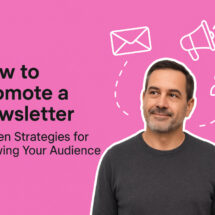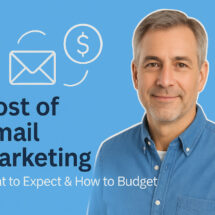Event email marketing: How to build excitement for your next event
By Kaleigh Moore November 21, 2023
Event email marketing is a key strategy for building anticipation for your next event—whether online or offline. This post explores key event email marketing examples and strategies to help.
When a survey asked event marketers their most effective strategy for getting the word out, the results were interesting:
The best strategy wasn’t word-of-mouth. It wasn’t social media.
It was email.
Over 75% of the event marketers polled said email marketing was their preference. They reported 45% of their total event ticket sales came from email marketing campaigns.
That makes event marketing simple, right? Sign up for an email platform, tie in an event marketing platform like Eventbrite, and you’re good to go.
But just because one medium is the most effective doesn’t guarantee future results.
To make event email marketing work for you, you need to learn what it is and how to use it. You’ll need announcement and drip campaign emails to pump up excitement well before the event. And a few examples to show how it’s done won’t hurt, either.
Let’s dive in.
What is email marketing for events?
Email event marketing is a newsletter-based strategy for building urgency and attention for an upcoming get-together. A good email event marketing strategy has a few different features:
- Building excitement and anticipation for the event, which helps you sell more tickets
- Announcing, with perfect clarity, the key details—such as the date, the time, and how to get to your event
- Providing links and details if your event is web-based
- Answering questions about the event upfront. This creates less confusion when the day finally comes
These steps sound intuitive enough. But remember: event email marketing can be different than your usual email marketing strategies.
The typical strategy might be to filter new potential customers to your lead magnet. The benefits you can receive from this strategy can build over time, with no end in sight.
Event email marketing best practices
Email event marketing is more like building a campaign around a story. It has a beginning, a middle, and an end: the event itself.
If you want to do it effectively, you’ll need to keep a few best practices in mind:
Personalization
An event should feel more “real” than most newsletters.
Events mean meeting people face-to-face, either on a webcam or in person. It’s one thing to get a potential customer to sign up for a lead magnet. It’s another thing to get them to commit to attending, say, a conference.
With a good email marketing platform, you can incorporate personalization features aplenty:
- Use a platform like AWeber to automatically enter each subscriber’s unique first name
- Use subscriber segmentation and tag each user with a specific category so you can send them event-specific content
- Add code to your website and engage with subscribers based on their particular site-browsing habits
Set up your campaign correctly from the get-go, and your event emails will come across as eerily telepathic.
But there’s nothing strange going on. You’re just practicing good personalization habits and skipping those newsletter subscribers who might not be interested.
Customer segmentation
Speaking of customer segmentation: you wouldn’t invite an email list of cat lovers to an event at a dogs-only park, would you?
Not if you wanted anyone to show up.
With customer segmentation features, you can tag specific subscribers. Or you can drill down even further, separating subscribers by the types of events they might want to attend.
If you have a far-reaching audience, for example, you can tag “NY-Events” for subscribers local to the New York area.
Segmentation ensures that you don’t waste any time by campaigning to crowds of people who have no intention of ever attending your events.
It’s not enough to have a “[CUSTOMER_NAME]” box at the beginning of your email.
Use customer segmentation tags to ensure every email feels relevant to every group you’re engaging. Your goal? Identify specific niches of subscribers who will be enthusiastic enough to reserve a spot at your event.
Making the event seem real
There’s a funny thing that happens with online interactions. We often forget we’re interacting with other people. As Psychology Today notes, one survey found that college students had the greatest increase in well-being when they interacted with people in person.
Simply put, online interactions don’t register quite as “real” as face-to-face interactions do.
And that can be a hard sell. After all, you probably got most of your subscribers from online interactions.
Now, with event email marketing, you’re asking people to start seeing you as a real person. You’re asking to change the context of your relationship, which requires a different style of engagement.
Start by making the event seem real:
- Open loops that can only close in person. For example, maybe someone enters a contest online—but they can only collect the prize in person.
- Use compelling visuals. Do you have snapshots from a previous event? Include them. Even if your event is completely online, include headshots for every guest who will appear.
- Share a personal story. Does the event come out of a personal story or realization you had? Share it with your audience. If your event is a lecture or web conference about a specific topic, talk about the personal circumstances that led to your discovery of that topic.
How to use email marketing to spark interest in your event
Email marketing is like any other type of marketing. Except this time, you want more than a click.
You need to motivate people to turn up, sign up, or even pay a hefty amount of money just to get in.
Those are big asks. If you have a young newsletter subscriber base, they’re especially big asks. You may still be in the middle of building familiarity with your audience.
To ensure your event sparks enough interest, build the following strategies into your campaign:
Get your announcement in early
Ever notice how Hollywood doesn’t kick off a movie campaign with a full movie trailer anymore?
It’s usually a series of teases. They’ll release pictures from the set years in advance. Or they’ll hype up a brief “trailer tease” on YouTube.
Finally, the full trailers become blockbuster events themselves: sometimes they debut during halftime of Monday Night Football.
The final trailer. Tune in to Monday Night Football on @ESPN to watch it live. #TheRiseOfSkywalker pic.twitter.com/QAme0H5j0D
— Star Wars (@starwars) October 19, 2019
The key to this strategy is starting early. Plant those seeds of excitement. Get on peoples’ radar well in advance of the event.
Excitement begins with your first announcement email. So now’s the time to start brainstorming.
Brainstorm your email subject lines
We’ve got a few ideas for best practices on email subject lines. Let’s do a brief review:
- Keep them under 45 characters. This ensures people can read a complete thought without clicking. Otherwise, your subject lines might fade into ellipses in your recipients’ inboxes.
- Use the “sentence case” for your headers, which keeps things casual. These emails should look like they’re coming from old friends.
- Create a “curiosity gap.” This means you should introduce a mystery with your subject line. If readers want to solve it, they’ll feel compelled to click the email.
Then write down a list of your best ideas for announcement subject lines.
And here’s the trick: sleep on them. When you’re fresh, look at them anew. Ask yourself which one popped as the most compelling.
Chances are, that’s your winner.
Build an event landing page
True: an event is not a static thing. It will come and go. Building a website can feel like overkill when you know this is just a temporary campaign.
But you still need a centralized hub where people can find key information and sign up for campaign emails.
Within AWeber, you can build a specific landing page with customer tags. This way, only the newsletter subscribers who might be event attendees will get the segmented emails.
You can also use the landing page as an opportunity to do some of the legwork.
Any event is going to have Frequently Asked Questions:
When and where? How can you attend? How much do tickets cost?
You’ll likely repeat this information in social media posts and emails. But having FAQs up on a landing page will ensure the answers are there for anyone who wants them.
(More on building your landing pages in a moment.)
Begin capturing images from the venue—or use stock images
If you’ve already booked a venue, use that venue’s existing images to make the event seem more “real.”
It’s one thing to say you’re renting an auditorium. It’s another thing to show a picture of 100 empty seats and write the headline: “Three more days…”
If you don’t have access to those pictures, you can always choose stock pictures, including those relevant to the event’s city, to help build anticipation.
Or ask guests for headshots you can include on your landing page and emails.
Photographs are so important to our perceptions, they can even influence our memories. The more visual your campaign gets, the more “real” it will feel when the week of the event rolls around.
Create periodic reminders
A typical story has a three-act structure:
- An inciting incident, which pulls the story out of its complacency and creates urgency
- A second act of increasingly complex problems and escalating tension
- A climax where the fate of the story hangs in the balance
You don’t have to turn your event emails into a novel anytime soon, true. But you should have a loose sense of this structure as you build anticipation for your event.
Enter “periodic reminder” emails.
If the announcement email was your inciting incident, these period reminders will fill the space of a long second act.
And that can be a challenge. The exciting first announcement and the third-act buildup to the event are typically the most exciting parts of an email campaign.
What do you do to create periodic reminders in between? Here are a few ideas:
- “Unpeel the onion.” Like a great mystery writer, only unveil one clue at a time. Create intrigue by presenting images, prizes, and other elements from your event out of context. Keep your audience guessing, then slowly reveal what each layer of the onion means to the ultimate event.
- Give away the details. No need to be coy about the logistics of your event. Instead, allow people to add events to their calendar—including dates, times, and web addresses.
- Build your reminders in sequence. It’s more fun if your emails run in a specific order, with each email expanding on what you wrote in the previous edition. For example, Canva sends instructional emails where each lesson adds mini-skills on top of the emails that came before.
- Create a drip campaign. Schedule your “second-act” emails as a drip campaign from the outset, which helps you create a natural chronological timeline that feels like a story unfolding.
Gather FAQs and store them on your landing page
It’s only natural: an event is going to garner some questions.
When? Where? Who?
If you treat your event email marketing campaign as a true-blue campaign, then every campaign needs that landing page.
This is the “sales page” for your event. And like a good sales page, it should anticipate—and answer—every customer question beforehand.
Start with Frequently Asked Questions you know people will have. The five Ws: who, what, where, when, and why.
Explain what people can expect to get out of your event, even if it’s something as simple as a fun night out.
And as questions come in, don’t forget to note these and jot down your answers. Ideally, your landing page will be a complete “hub” of any and all information related to your event.
All that’s left for the customer is to invite themselves by entering their email address. From there, you can tag them to a segmented email list and get them started on your drip campaign.
Get involved on social media
Event email marketing may be the best way to get people to sign up, but you still need people to discover your emails in the first place. And social media can be a great way to draw them in.
One strategy is to maximize your use of hashtags:
- Create an event-specific hashtag (like #Your-Event-Here-2024) to build a hashtag “hub.” Anyone who wants to submit their post, attach a photo of their invitation, or announce they’re attending can use this hashtag for visibility.
- Use event-adjacent hashtags to get more eyeballs on your posts. These are particularly effective when you have industry-specific hashtags you can use. People in your industry—who may already be looking for events—can find your posts with a simple search.
And keep at it. Maybe your hashtag posts won’t draw 500 likes and engagements overnight. But every new post keeps your event at the top of the search results whenever someone looks for the hashtag.
Social media is also a great place to begin contests and prizes to create excitement. You can even use Re-posts on X and other social shares as ways people can enter, drumming up even more engagement from your audience.
In the example above, an event for Ukraine Aid shows off how to create social posts:
- Inspiring, high-contrast visuals to draw the eye
- Essential information: who, when, where, what, and why
- Hashtags like #PossibleWithU help enhance the visibility.
Tips for building urgency when it’s crunch time
Now we enter the third act of your campaign: the climax.
It’s crunch time.
Your tool for building urgency here should be to play on scarcity. Scarcity is simple: the less of something there is, the more people will want it.
Scarcity is a natural fit for event email marketing because an event is inherently scarce. It only happens once. And chances are, there are all sorts of opportunities to highlight scarcity:
- You may only have a certain amount of online guests
- There are only a certain number of seats or spaces
- A venue may have a maximum capacity
- If the event is only happening once, your audience could miss it
- A limited number of VIP spots
That latter point is key. Creating “VIP tickets” can be a great way to inspire new sign-ups when you’re still in the “Drip campaign” phase of the overall campaign.
For example, “Withings” watches once created a Cyber Monday sale with the following headline:
“Tomorrow is too late.”
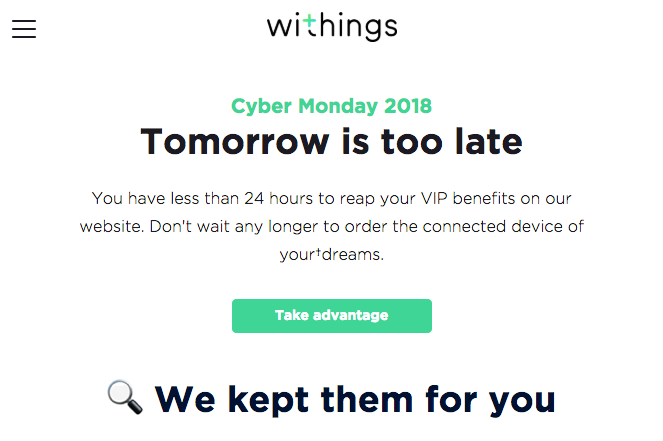
It’s an instant eye-grabber.
Why is tomorrow too late? If I take action now, am I one of the lucky few?
If you don’t have special VIP offers, you can build urgency with unique incentives. Maybe time is running out on a prize contest. Maybe there are only so many prizes you can give out at the door.
These incentives are particularly useful if you’re approaching the event date and still don’t have enough signups. Some customers may just need one final nudge before they commit to your event.
Types of event emails (with examples)
Using story structure, you should split your event emails into three major categories:
- The announcement is the inciting incident: you want to surprise people, pull them out of their lull, and tell them what they can get by attending your event.
- The drip campaign emails are the long second act: slowly build urgency, reveal new answers (such as mystery guests), and remind people of what’s coming.
- The excitement emails will be your big climax: building urgency for the event.
Announcement emails
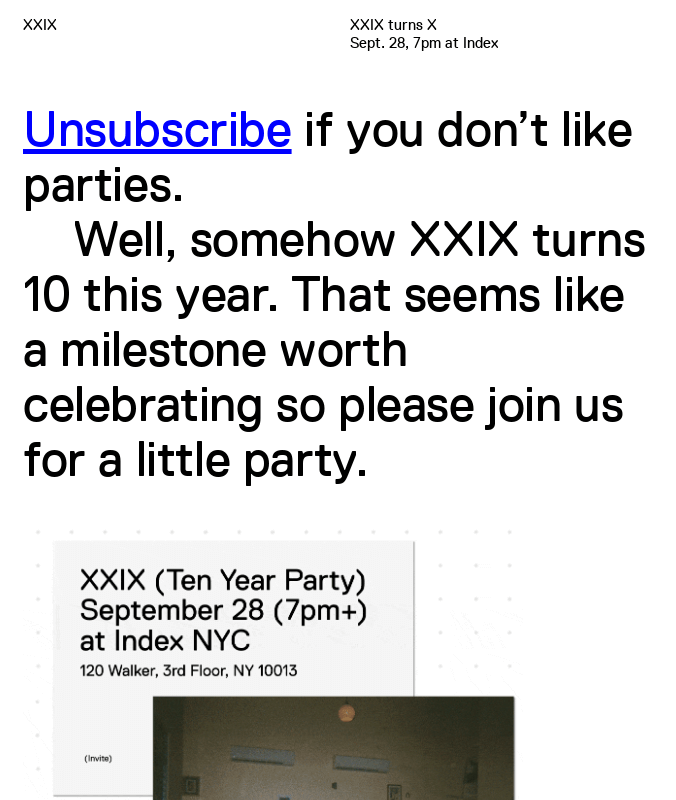
XXIX’s ten-year party announcement email starts with a fun “incitement” sentence: Unsubscribe if you don’t like parties.
Well, we all like parties. Now they have our attention.
Here are the keys to this announcement email’s success:
- An opening sentence that challenges the reader and creates a bit of a curiosity gap. Don’t tell me I don’t like parties!
- It gets the announcement out early by mentioning a key milestone: XXIX turning 10 years old. There’s the answer to your “why.” It also makes the event date a little easier to remember.
- The email gives details right away so people who are already interested can start saving the date and putting the address in their calendars. Yes, it’s good to create intrigue, but you don’t want to be mysterious about the logistics.
Here’s another example, from TwitchCon:
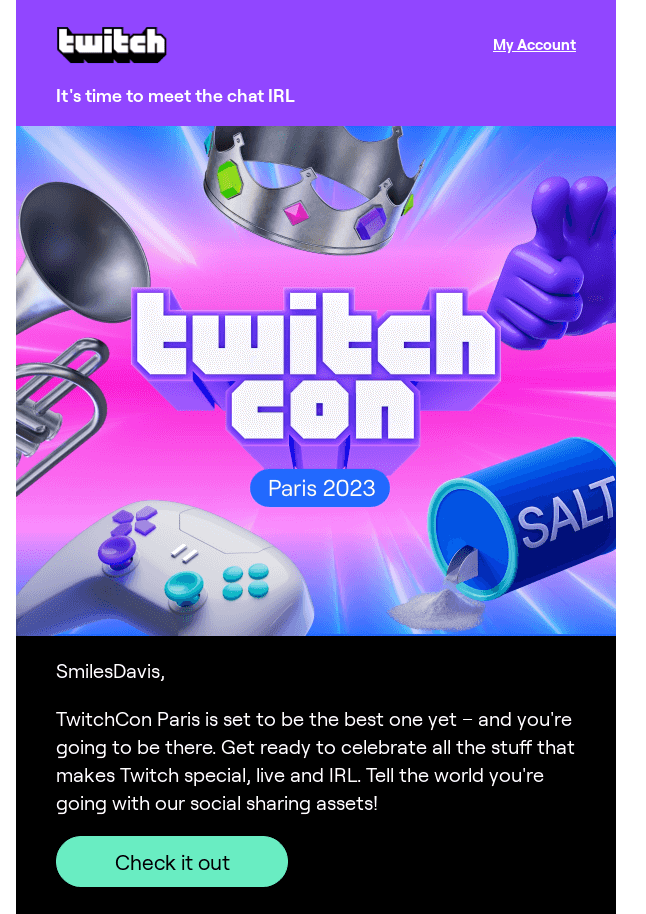
With the confidence of “you’re going to be there,” this announcement email gets straight to the point:
- It explains why you’d want to attend TwitchCon in Paris: “Get ready to celebrate all the stuff that makes Twitch special.” And it answers another “W” question by explaining who will be there.
- It uses social proof with specific faces and usernames of popular streamers. This immediately draws the interest of these streamers’ followers.
Drip campaign emails

Bloomreach uses specific details to draw your interest. If you’re part of their audience, there’s a good chance you’ll find something at this event you’ll like.
- This email for Bloomreach re-invites people by mentioning the specific event details they must know. But it doesn’t have the big “splash” of a launch email. Instead, it tackles the meat and potatoes of the reasons to attend the event, including specific topics and speakers.
- Includes basic details about when the event is, along with an above-the-fold call-to-action for people who are immediately interested.
Now let’s look at a similar example from a 2023 conference from Maze:
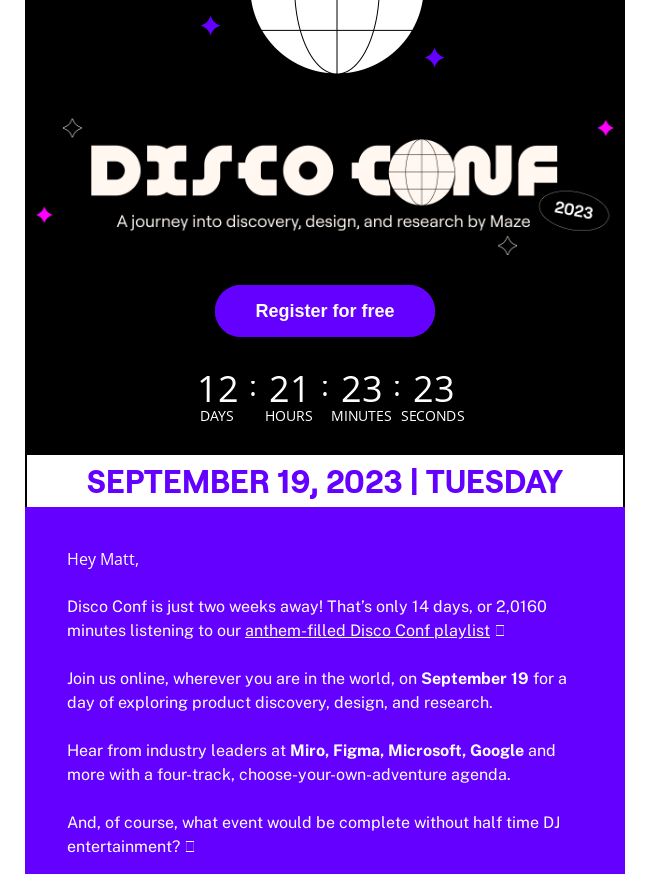
Keys to success:
- Notice the time here, a fun, urgency-building transition to the final leg of the campaign.
- The email still highlights what the fun of the event might be: “Join online on September 19 for X, Y, and Z.”
- The email mentions the DJ entertainment while discussing specific speakers at the event, giving you more reasons to join in.
- It finishes off with a strong call to action: registering for free.
Excitement emails
It's almost time! ⏰ We're back tomorrow for G2E 2022.
— Global Gaming Expo (@G2Eshows) October 9, 2022
Follow along on our pages this week, October 10-13, as we share highlights from the show. It’s not too late to register: https://t.co/WolNcdnYIY pic.twitter.com/ZqgBUO69EM
Although not an email, this tweet with an animated “timer” builds urgency and anticipation by letting you watch the seconds tick away.
- Notice the line “it’s not too late to register,” along with a strong CTA. It may be a tweet, but it reads like an email.
- The animation highlights how quickly time is passing, which builds urgency—even if it’s unconscious.
Sundance’s upcoming 2024 film festival uses some similar principles:
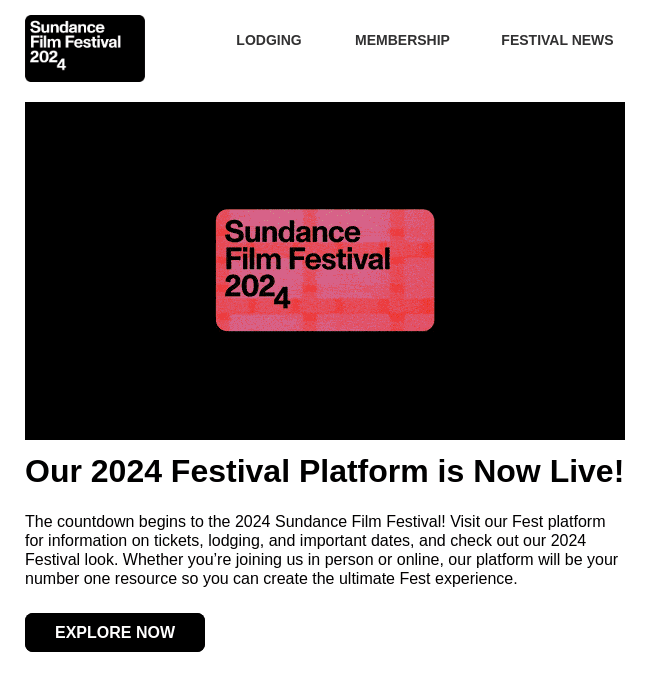
This email for the Sundance Film Festival doesn’t go off-brand with last-minute contests and prizes. But it does highlight that a “countdown” is beginning:
- The email builds urgency by highlighting that the lodging is selling “fast.” Even if people think they have plenty of time left to register, there are other elements of logistics you can use to build scarcity.
- The email includes specific event details, which is essential at this stage of event marketing emails.
- Finally, the email includes a new offer that can help nudge people who were on the fence about attending.
Build an event email marketing campaign
An event email marketing campaign is still like other campaigns you’ve attempted. It should have a specific landing page, populated with all sorts of information. You should use customer segments to personalize your messaging.
What’s different? Every event is a story with a beginning, a middle, and an end—a climax that culminates in the event itself. If you can build urgency up to the end, you’ll have a successful campaign.
But it all starts with a capable email platform. An email platform that allows for effective user tagging, customer segmentation, and automated drip campaigns to help build excitement.
Don’t have an account with AWeber just yet? Sign up for free today. After all, the clock on your next event is ticking.
